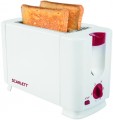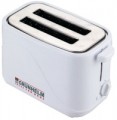—
Auto-centering. Function found in toasters (see "Type"). Thanks to auto-centering, each slice of bread is placed in the centre of the compartment during cooking, at the same distance from the heating elements, and toasted on both sides equally.
—
Heating. Operating mode of the toaster (see "Type"), in which the product is not fried, but only slightly warmed up. This function can be useful, for example, to reheat previously cooked toast.
—
Defrosting. Toasters often include a specialized function, found in their features (see Type), for toasting frozen bread. Frozen bread cannot be directly fried, as it requires defrosting first. The toaster's defrost mode provides a convenient way to defrost frozen bread quickly and efficiently.
—
High lift. Possibility of lifting cooked toast above the standard height. This feature is useful when toasting small slices of bread that would otherwise be difficult to remove from a hot toaster.
—
One-sided frying. Possibility to toast on one side only. This function can be useful, for example, when making toast from a piece of bread — on the one hand, it no longer needs to be fried.
— Readiness indicator. An external indicator, typically in the form of a light, is used to signal the completion of cooking in certain toasters
...(see Type). It's worth noting that in traditional toasters, this function is relatively uncommon. Instead, the completion of toasting is indicated by the toast popping up from the compartments accompanied by a noticeable click and sometimes an additional sound.
— Overheat protection. Safety system that automatically turns off the device when the heating element or body reaches a critical temperature. This allows user to avoid unpleasant consequences, ranging from a breakdown of the device and ending with a fire.A separate compartment for the power cord allows you to hide this cord in the body of the device, which greatly simplifies storage and transportation. At the same time, such a compartment can also be supplemented with a device for uniform winding — it does not only provide additional convenience, but also protects the wire from bending and fractures.

